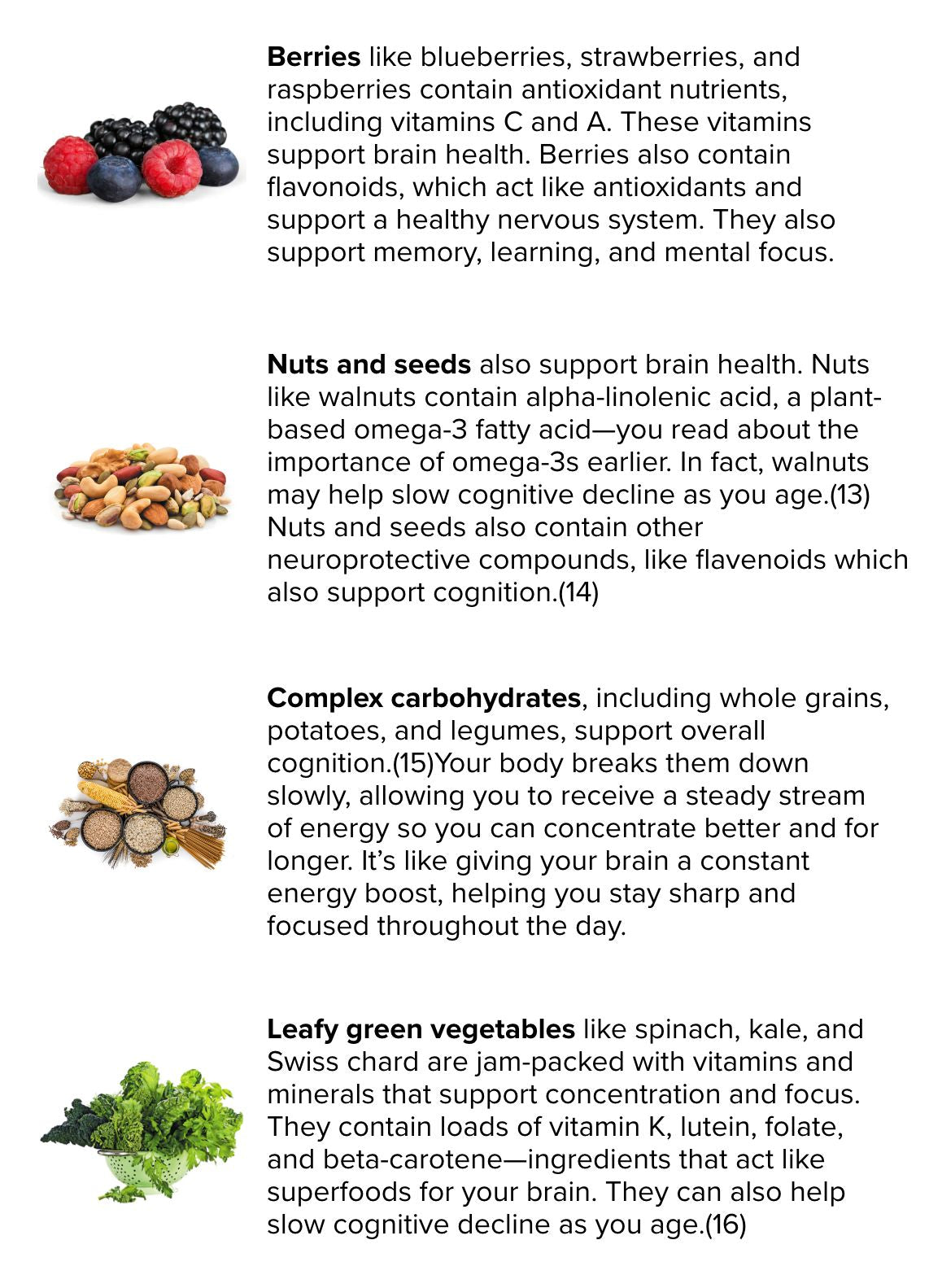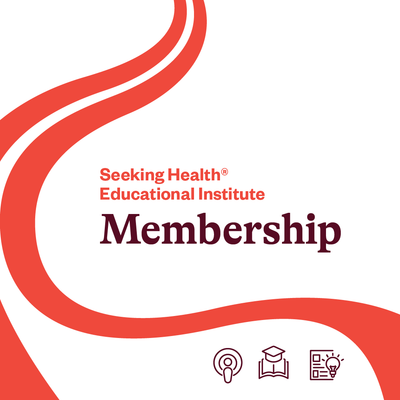Today’s highly connected world is full of distracting stimuli. You may find it harder and harder to concentrate on the task at hand. Rest assured, there are steps you can take to support your overall brain health that can also help you become more resilient to distraction.
Keep reading to find out what you can do, from exercise to supplementation, to support cognition throughout your life. Remember that Seeking Healthy has your back by offering supplements to help you get the vitamins and nutrients your body and brain need to support good health and an active life.†

What’s the Difference Between Focus and Concentration?
Understanding the difference between focus and concentration is critical to understanding how your brain works. Although these terms are often used interchangeably, they hold distinct meanings.
Concentration is directing your mind toward a specific task or subject without distraction. It's like having a spotlight and being able to shine it on one subject while keeping everything else in the dark.
Focus deals with the range and sharpness of that spotlight. It's about how effectively you can zoom in on the object you're trying to concentrate on. It also helps you remain attentive.
Understanding these differences can help you work and learn. By supporting concentration and focus, you can problem-solve more steadily when completing tasks.
What Causes a Lack of Concentration and Focus?

There are several factors to explore that can make it harder for you to focus and concentrate.
Internal factors include:
- Not managing stress.
- Feeling nervous and worrying.
- Not getting enough quality, restorative rest and sleep.
External factors include:
- Distractions, like the constant pinging of your smart device notifications.
- Poor nutrition and eating too many processed foods or "fast" foods.
- Lack of physical activity and not getting enough exercise.
You need to examine these elements in your life closely. Doing so can offer valuable insight into changes that can support your cognitive ability. You'll also understand the profound connection between your daily habits and mental functions and how one can make the other feel impossible.
How Can You Support Focus and Concentration Naturally?

You can incorporate several healthy habits into your daily routine to support your focus and concentration naturally.
- Mindfulness meditation. Take time during the day to sit quietly with your thoughts. This can help you anchor your attention to the present moment to prevent distractions. It can also help you keep calm which in turn helps support awareness and focus.(1)
- Physical activity. Regular exercise, particularly aerobic activities like walking, running, or cycling supports brain function.(2) Exercising helps release neurotrophic factors crucial in cognitive processes, including learning, memory, and concentration.
- Rest and sleep. The importance of getting regular, restorative sleep cannot be overstated—a lack of sleep can result in cognitive decline.(3) When you sleep, your brain engages in "housekeeping." Toxins you accumulate during waking hours are removed, which helps your brain consolidate memories. This nightly reset supports your ability to focus the next day.
- Hydration. Staying hydrated positively impacts attention and focus.(4) Think of your brain like a sponge— it's hard to absorb information or think clearly when it's dry. But when it's hydrated, it swells up and can perform at its best.
What Vitamins and Nutrients Support Concentration and Focus?†
You can incorporate several vitamins and nutrients into your daily diet to support your concentration and focus:†
| American Ginseng | American Ginseng supports cognitive functioning and a healthy central nervous system. It supports working memory, focus, and attention.(5) American ginseng also supports your body’s healthy reaction to fatigue.† |
| Ashwagandha | Ashwagandha supports healthy cortisol levels, attention, and memory.(6) It supports your mental clarity and ability to focus. Ashwagandha also supports learning and memory which can help on the job and in school.† |
| Vitamin B | B vitamins—especially when you include a variety of them in your diet—support brain health and cognitive function.(7) These B vitamins include folate, B6, and B12 among others. They support processes like methylation, neurotransmitter production, DNA and RNA production, and overall cell health.† |
| Vitamin C | Vitamin C acts like an antioxidant within the brain, supporting cell turnover and health and energy.(8) It supports healthy oxidation levels so you can maintain cognitive agility and your ability to remain attentive and focused when performing tasks. It also supports iron absorption, another nutrient essential for brain health.† |
| Vitamin D | Vitamin D receptors in the brain play a key role in cognitive function. It may support the brain’s natural neuroprotective pathways.(9) Vitamin D may also play a role in processing speed, mental shifting, and information updating as you age. Maintaining healthy vitamin D levels can help support brain health throughout your life.† |
| Iron | Iron supports red blood cell protein (hemoglobin) production. Hemoglobin transports oxygen throughout your body, including your brain. Healthy oxygen levels support normal brain health and cognitive performance. Iron also supports healthy neurotransmitter levels that are important to cognitive processes. An iron deficiency (anemia) may make you vulnerable to problems with cognition.(10)† |
| Omega-3 fatty acids | Omega-3 fatty acids are essential nutrients for brain health. They support concentration and mental clarity, and your body’s healthy response to fatigue. Omega-3s also help support healthy cell membrane structure so your brain can send and receive messages. They may be especially important for supporting brain health starting in middle age.(11)† |
Always remember to speak with your healthcare practitioner before including these vitamins and nutrients into your daily routine. This can help you avoid allergic reactions and medication interactions, so you can stay healthy.
What Foods Support Mental Focus and Concentration?
Feeding your brain a nutrient-rich diet supports your ability to concentrate and focus.(12) Your brain needs a rich, balanced diet to work at its best. Foods rich in antioxidant nutrients like vitamins C and A help support healthy cell production, inflammatory responses, and—you guessed it—cognition.

On the flip side, a diet high in refined sugars and unhealthy foods doesn't support brain health. Eating too many processed foods can lead to fluctuations in blood sugar levels, which can cause your energy to wax and wane instead of staying consistent—and lead to blood sugar issues.(17) These changes can hurt your ability to concentrate and focus, leaving your brain foggy.
Seeking Health’s Focus Supplements
If you’re ready to start a supplement to support concentration and focus, you can check out the focus supplements Seeking Health has developed with you in mind. Our supplements contain the right mix of nutrients to support your overall cognitive performance, so you can think and work optimally to meet the day's challenging demands.†
- Optimal Focus contains American ginseng and supports healthy memory, clarity, focus, and learning. These capsules are stimulant-free, so you don’t have to worry about side effects like feeling revved up or restless while trying to concentrate.†
- Homocysteine Nutrients support healthy methylation and homocysteine levels and, in turn, healthy cognition and brain function. This unique blend of nutrients contains B12 and folate, which help support your ability to concentrate and focus.†
- Ashwagandha is a powerful adaptogen formula and contains pure ashwagandha root powder. It helps support a healthy stress response so you can put your energy towards what needs your attention most. †
- Hyrdoxo B12 with Folinic Acid is methyl-free and supports methylation, energy, and cognition. It helps support mental clarity so you can think and perform at your optimal best.†
The Bottom Line

Harnessing your brain power is essential to concentration and focus. Doing so helps you meet the demands of work, school, and family without feeling exhausted. To support your brain health, you can incorporate simple practices into your daily routine. These include meditating, exercising, resting, and drinking plenty of water. Eating the right foods will also support your mental agility and clarity.
You can also include several essential vitamins and nutrients in your diet that help support your cognitive function. These include ashwagandha, B vitamins, omega-3s, and American ginseng. Seeking Health makes it easy to add these elements to your daily routine. You can choose from several supplements to support your cognitive well-being today and always.†
References
- https://pubmed.ncbi.nlm.nih.gov/33783922/
- https://pubmed.ncbi.nlm.nih.gov/34561368/
- https://pubmed.ncbi.nlm.nih.gov/32955572/
- https://pubmed.ncbi.nlm.nih.gov/24480458/
- https://pubmed.ncbi.nlm.nih.gov/20676609/
- https://pubmed.ncbi.nlm.nih.gov/34858513/
- https://pubmed.ncbi.nlm.nih.gov/26828517/
- https://pubmed.ncbi.nlm.nih.gov/31963141/
- https://pubmed.ncbi.nlm.nih.gov/32399297/
- https://pubmed.ncbi.nlm.nih.gov/34208355/
- https://pubmed.ncbi.nlm.nih.gov/36198518/
- https://pubmed.ncbi.nlm.nih.gov/18568016/
- https://pubmed.ncbi.nlm.nih.gov/31912155/
- https://pubmed.ncbi.nlm.nih.gov/35333451/
- https://pubmed.ncbi.nlm.nih.gov/31728502/
- https://pubmed.ncbi.nlm.nih.gov/29263222/
- https://pubmed.ncbi.nlm.nih.gov/34904160/
†This statement has not been evaluated by the Food and Drug Administration. This product is not intended to diagnose, treat, cure, or prevent any disease.












